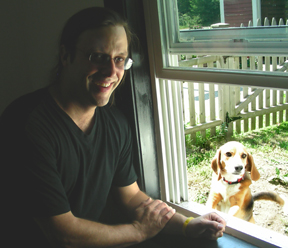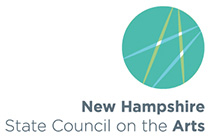 |
Clark Knowles, Fiction Writer, Portsmouth
By Jane Eklund
 Clark Knowles had been working very happily at the Music Hall, Portsmouth’s nonprofit performing arts center, for seven years, moving into a position as director of facility and production, when he had, as he puts it, “a minor, approaching-30 freak-out.” Clark Knowles had been working very happily at the Music Hall, Portsmouth’s nonprofit performing arts center, for seven years, moving into a position as director of facility and production, when he had, as he puts it, “a minor, approaching-30 freak-out.”
The problem wasn’t with his job; rather, it was the realization that for years, he’d been calling himself a writer, but he hadn’t been writing.
Clark, who grew up in a Virginia suburb of Washington D.C., had moved north, after graduating from George Mason University, with the intention of earning a master’s degree in creative writing at the University of New Hampshire. He wasn’t accepted to the master’s program, however, and settled in to the Music Hall job instead.
His small “freak-out” brought him back to his original aim. He took a fiction writing workshop at UNH, and his work was good enough to get a slot in the university’s graduate program and, eventually, an instructor job in the English Department. Along the way, he earned a Master of Fine Arts degree at Bennington College.
And he put writing at the center of his life, where it shares space with his family (his daughter, Grace, nine, is a fourth-grader, and his wife, Gail, works in e-commerce), with teaching, and with renovating an early 19 th-century farmhouse in Portsmouth. He’s published short stories in such prestigious journals as Glimmertrain Stories and the Black Warrior Review, and earned the Mark Twain Award for Short Fiction from Red Rock Review.
He’s currently at work on his third novel; the fellowship award will help him finish it. But winning the fellowship isn’t just about the $5,000, Clark says. “I’m really psyched about the money. It’s going to be a big help. But the really cool thing is just outside of the money, what it means,” he notes. “It feels like this is a first step in the rest of my writing life.”
In Clark’s case, it’s a step into deep water, fictionally speaking. His novel-in-progress was sparked by the 2004 tsunami in Indonesia, and then fueled by Hurricane Katrina. The first chapter, which he submitted to the State Arts Council as part of his fellowship application, takes place in the watery aftermath of an apocalyptic flood.
“It’s a risky piece of writing,” he admits, one that steps outside the realm of realism and wades into myth. “It’s going to cover about 10,000 years.”
Clark, who’s 42, says, “It’s taken me a long time to figure out who I am when I sit down to write.” His process has changed over the years, too, and it’s depended, in part, on the circumstances of his life. There was a time when his writing sessions were very scheduled, when he’d get up early and work before his family began to stir. In his last house, he wrote in an unfinished basement, on a desk made of a sheet of plywood and two sawhorses, in an area presided over by an oil tank and furnace. In the farmhouse, he’s got an attic space set aside for writing – once he’s able to renovate it. For now, he writes in the living room, when he has time.
First drafts are the hardest for him. Rewriting, though, is another story. “I love revising,” he says. “That’s when I can really make the writing come alive for me.”
What else fuels his writing?
“I drink a lot of coffee,” he says.
Back
to 2009 Fellows page
Photo by Jane Eklund, NHSCA
Last
updated:
January 16, 2009
|
|

